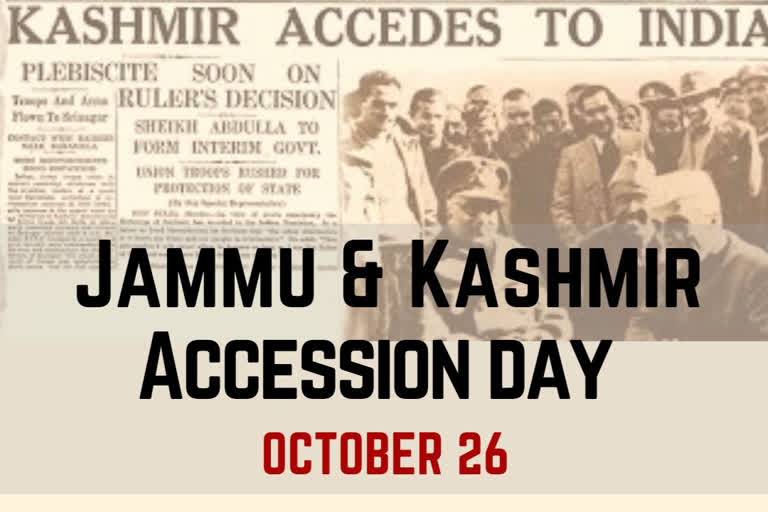Hyderabad: Since 2020, the erstwhile state of Jammu and Kashmir, which was downgraded to a Union Territory in 2019 after the abrogation of Article 370, marks October 26 as a public holiday.
On October 26, 1947, Maharaja Hari Singh, the last Dogra monarch of J&K, agreed to accede to the dominion of India and signed the Instrument of Accession with the then Governor-General of India, Lord Mountbatten, marking India’s accession of the erstwhile princely state.
Prior to 2019, Accession Day was observed as a 'Black Day' by separatist leaders in Kashmir. However, the same stopped as most of them were jailed in the aftermath of the Article 370 abrogation.
Following it, the central government announced to observe October 26 as Accession Day and declared it a public holiday. Meanwhile, the union territory also dropped Martyr’s Day (July 13) and the birth anniversary of Sheikh Abdullah (December 5), former chief minister of J&K from the list of public holidays in 2020.
Signing of the Instrument of Accession
The Instrument of Accession was signed by Maharaja Hari Singh in Karan Palace in Jammu on October 26, 1947, which was brought by the then Union secretary from Delhi. The IoA was taken back to Delhi for acceptance by the Governor-General of India, who approved and signed it in the early hours of October 27, 1947.
Acknowledging the historic significance of October 26, for the first time in last over seven decades, the Government of Jammu and Kashmir announced a public holiday in 2020 to mark the momentous occasion.
Here are the series of events that led to the state of Jammu and Kashmir acceding to India:
Post India's independence
Originally, Maharaja Hari Singh had decided to retain the independence of his state, signing standstill agreements with the neighboring countries to maintain the status quo. However, after he faced attacks from Pathan tribespeople and army personnel from Pakistan, he sought India’s help. Hence, Maharaja Hari Singh wrote to Lord Mountbatten seeking military help.
Mountbatten’s advice
Mountbatten replied saying, “It is my government’s wish that as soon as law and order have been restored in Jammu and Kashmir and her soil cleared of the invader, the question of the State’s accession should be settled by a reference to the people.” This remark is said to be the seed of the Kashmir dispute. The IoA provided the Indian Parliament with the capacity to legislate in respect of J&K in matters of Defence, External Affairs, and Communications.
Attempt to a plebiscite
Following Mountbatten’s advice, the Indian government had to conduct a plebiscite, or referendum, for the Kashmiri people to decide if they wanted to stay a part of India, Pakistan, or remain an independent state. However, the plebiscite could not take place as the Pakistani government and a part of Kashmiri residents questioned the legality of India’s accession to Kashmir, which up till now remains a point of debate.



